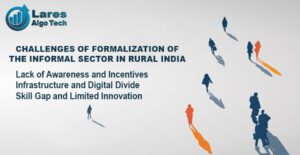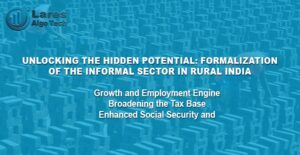India’s ambitious goal of becoming a $5 trillion economy in the upcoming years has captured the world’s imagination. To achieve this monumental feat, however, the nation must tap into the formalization of the informal sector in rural India’s economy, which constitutes roughly 39.1% of GDP at PPP levels and employs nearly 80% of the workforce. In this article, Mr. Maya shares his insights as well as discusses the challenges, policy measurement, and best practices.
Yet, a significant portion of this rural economy remains shrouded in informality, operating outside the formal regulatory and tax systems. This informality, while contributing to the vibrant tapestry of rural life, also presents considerable challenges, hindering productivity, quality, and access to crucial resources like finance, technology, and markets.
Challenges of Formalization of the Informal Sector in Rural India
Formalization of the informal sector in rural India is no easy feat. Several hurdles stand in the way:

- Lack of Awareness and Incentives: Many informal enterprises and workers lack knowledge about the benefits of formalization, such as access to credit, insurance, social security, and legal rights. The perceived costs of compliance with regulations and taxes can further discourage them from entering the formal fold.
- Infrastructure and Digital Divide: Rural areas often have inadequate physical and digital infrastructure. Limited access to roads, electricity, internet, and mobile connectivity stifles formalization. Additionally, low levels of digital literacy and adoption among the rural population create a barrier to online platforms and services crucial for formalization.
- Skill Gap and Limited Innovation: The informal sector in rural India is often characterized by low levels of education, training, and skill development. This hinders productivity, quality, and competitiveness. Furthermore, a lack of innovation and reliance on traditional, low-value activities like agriculture and handicrafts limit the sector’s growth potential.
Unlocking the Hidden Potential: Formalization of the Informal Sector in Rural India
Despite these challenges, the Formalization of the informal sector in rural India presents a treasure trove of opportunities for economic and social development:

- Growth and Employment Engine: Formalization can boost output, income, and employment in the rural economy by enhancing the efficiency, profitability, and scalability of informal enterprises and workers. Integration with national and global markets unlocks further trade, investment, and value-addition avenues.
- Broadening the Tax Base: Bringing informal activities and transactions under the tax net widens the tax base and increases government revenue. This fiscal space can then be channeled towards crucial public goods and services like infrastructure, health, education, and social protection, further bolstering the rural economy.
- Enhanced Social Security and Sustainability: Formalization paves the way for improved social security and well-being for the rural population by providing access to formal institutions like banks, insurance, pensions, and legal recourse.
Additionally, it can promote environmental sustainability by encouraging the adoption of cleaner technologies and practices like renewable energy, waste management, and organic farming.
Policy Measures and Best Practices: Formalization of the Informal Sector in Rural India
To unlock the hidden potential of formalization of the informal sector in rural India through formalization, a multi-pronged approach is needed:

- Simplifying the Regulatory Landscape: Streamlining the regulatory and tax framework for the informal sector is crucial. Reducing paperwork, simplifying procedures, and offering incentives like tax holidays and credit guarantees can entice informal enterprises to formalize.
- Bridging the Infrastructure Gap: Investing in robust physical and digital infrastructure in rural areas is paramount. Expanding road networks, ensuring reliable electricity supply, and promoting internet access and digital literacy are essential.
- Investing in Skills and Innovation: Enhancing skills and fostering innovation in the informal sector is key to unlocking its full potential. Skill development programs, technology adoption initiatives, and support for entrepreneurship can drive productivity, quality, and diversification.
Formalizing the informal sector in rural India is a key strategy for achieving India’s 5 trillion ambition, as it can unlock the hidden potential of the rural economy and contribute to its growth, employment, and development.
However, formalization is not an easy or automatic process, as it requires overcoming several challenges and barriers and creating a conducive and supportive environment for the informal sector.
Therefore, the government and other stakeholders need to work together and adopt a holistic and inclusive approach, to enable the formalization of the informal sector in rural India, and realize its full potential.





